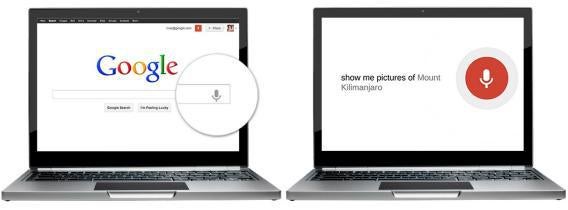Forget “OK, Glass.” As of today, the hot new voice command is “OK, Google.” As in, “OK, Google: Show me things to do in Santa Cruz.”
At its I/O developer conference in San Francisco on Wednesday, Google announced a more-or-less mind-blowing set of new search features that will have you talking to your computer as if it’s a person—or, more specifically, as if it’s the Star Trek computer. Among them is a feature for its Chrome browser called “hot-wording” that lets you issue commands and ask questions of Google on your laptop or desktop machine by saying “OK, Google.” It answers both by voice and with Knowledge Graph cards as well as traditional Web-search resuls.
When Google VP Johanna Wright asked her browser to show her things to do in Santa Cruz, it responded, “OK. Here are some things to do in Santa Cruz,” and displayed images of Natural Bridges State Beach, Mission Santa Cruz, and the beach boardwalk. She homed in on the beach boardwalk and asked, “OK, Google: How far is it from here?” Note that she said “it” and “here,” not “the Santa Cruz Beach Boardwalk” and “the Moscone Center.” Nevertheless Google intuited her meaning and replied out loud: “The distance from your location to the Santa Cruz beach boardwalk is 73 miles.” At the same time, the browser pulled up a map and directions.
Earlier in the same presentation, fellow Google VP Amit Singhal showed how Google search is moving beyond the Web to organize your personal emails, photos, calendar appointments, and other information. A search for “pictures from my trip to London” brought up Singhal’s own snapshots from a vacation he took last year. A search for “my restaurant reservation” pulled up the time and location of his reservation for dinner tonight.
The features are the next steps in Google’s long-term progression from a search-engine website to a ubiquitous artificial-intelligence machine that can answer any question you have on whatever device you happen to be using at the time. For now that includes your smartphone, your tablet, and your computer. In the future it might include your smart watch or smart glasses, your self-driving car, and who knows what else.
Ok, Google: That’s pretty impressive.
For more on the new features, visit Google’s Inside Search blog.
